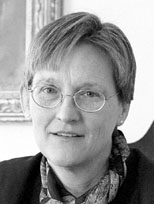Radcliffe Dean Faust receives Ad Hoc report
‘To support the creation of new knowledge.’

Radcliffe Dean Drew Gilpin Faust has received a report from an Ad Hoc Committee appointed last summer to help her chart a course for Radcliffe during its critical, early years as an institute for advanced study. The report, representing the work of distinguished scholars and academic leaders from outside Harvard, recommends organizational structures and intellectual agendas that will enable Radcliffe to best fulfill its stated mission – to support the creation of new knowledge – at the very highest level of quality.
“While this report is advisory to me, I find its vision inspiring and its recommendations compelling,” said Dean Faust. “The Ad Hoc Committee has set our sights high, outlining an exciting and challenging future. I plan to reflect carefully on the issues raised and to consult broadly within Radcliffe and Harvard and beyond as I consider both general principles and specific suggestions. I want to emphasize, however, that I find the report to be exceptionally thoughtful in its analysis and sound in its recommendations. Above all, it speaks to the opportunity and privilege of being here at this important moment in Radcliffe’s history as we begin to build an institute that will contribute in fundamental ways to what we know and how we think about the world.”
Specifically, the report offers six core recommendations to help Radcliffe realize its dual mission as a scholarly community within a research university where individuals pursue advanced work across a wide range of academic disciplines, professions, and creative arts, while simultaneously sustaining a commitment to the study of women, gender, and society. As delineated in the report’s executive summary, the six recommendations are:
Integration. The Institute should move toward integration as a single entity in intellectual, programmatic, and organizational terms. It should function as a unified organization with the faculty and fellows at its core, under the intellectual and administrative leadership of the Dean. Activities should be preserved or initiated only if they serve the central purposes of the Institute at the standard of quality required for an institute for advanced study.
Intellectual Agendas and Women, Gender, and Society. At the outset, the Institute should select certain fields from among the broad array encompassed in the stated mission as areas of focus, with the expectation that they will change over time. Studies of women and gender should not be isolated from other fields of inquiry. Rather, scholars who specialize in gender studies should be in constant interaction with others across the range of disciplines. Furthermore, the Institute should actively explore opportunities for cross- and multidisciplinary approaches to major research problems.
Faculty Leadership. Intellectual agendas should be set in direct relationship to the core undertakings of the Institute, and sustained research should be directed and carried out by fellows and faculty of the Institute. Such faculty should be either tenured at Harvard and serving jointly in an administrative role at the Institute or appointed to one of the academic positions permitted under the terms of the merger.
Archives and Outreach. The Radcliffe Institute should maintain an active engagement with various publics through its rich library and archival resources, continuously enlarged, enhanced, and made available for scholarly and general use; through public policy activities based on social analysis directed at issues of significance and public concern; and through educational outreach designed to share the work and insights developed at the Institute with scholars, teachers, and the interested public.
Physical Space. To succeed as a residential scholarly community encompassing individuals from a wide range of fields, the Institute should bring faculty and fellows together in a central location to work, to eat, and perhaps to live.
Administrative Review. At the outset of her tenure, the Dean should request a comprehensive administrative study to ensure that the organization, staffing, and administrative functions of the Institute are designed to serve the new mission in an efficient and integrated way, and that the programs of the Institute are finally sustainable.
President Neil L. Rudenstine appointed Radcliffe’s Ad Hoc Committee in July 2000. The committee was chaired by Caroline Bynum, University Professor (History), Columbia University, and included among its members the directors of the three other institutes for advanced study in this country.




